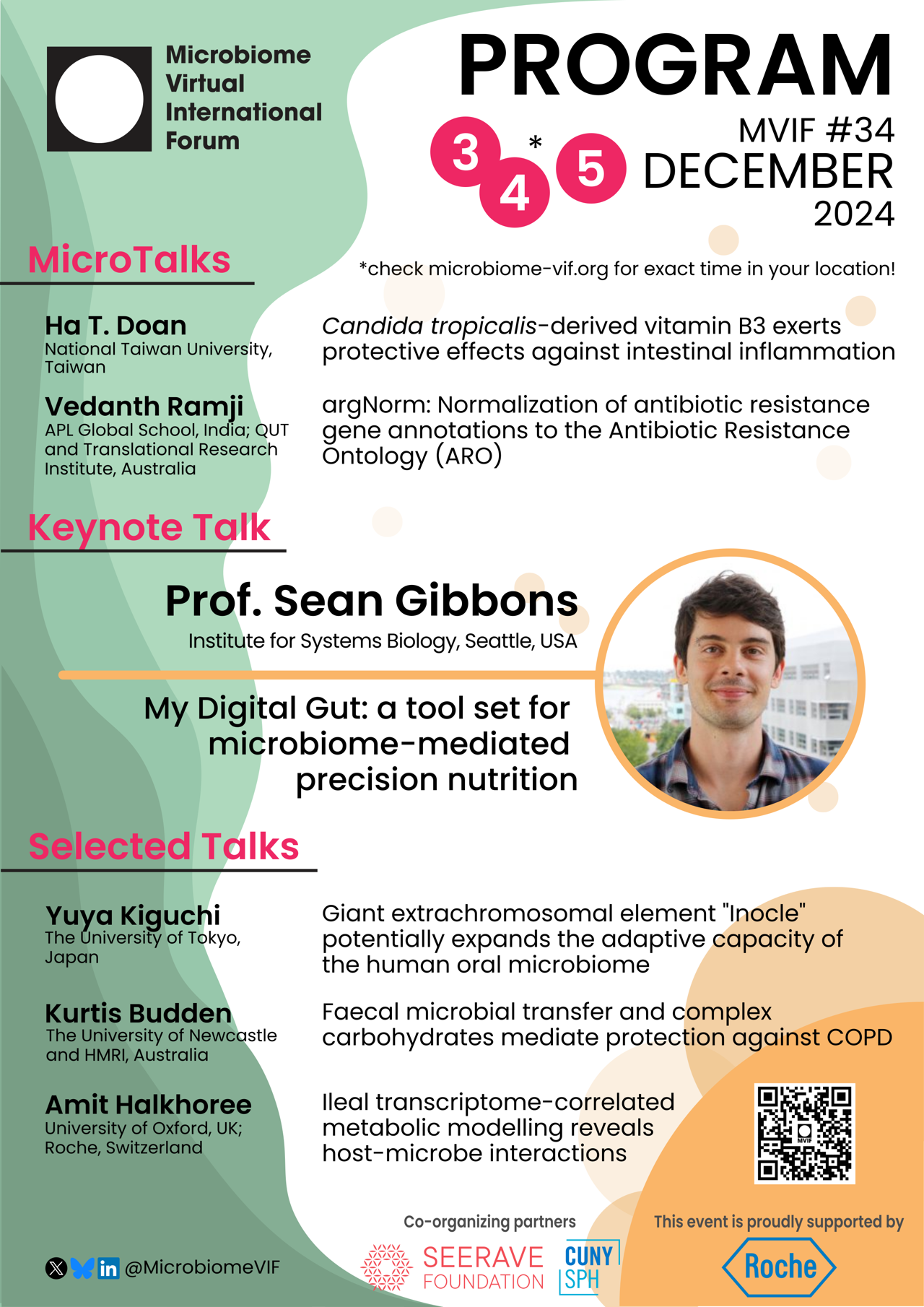Keynote talk
My Digital Gut: a tool set for microbiome-mediated precision nutrition
by Prof. Sean Gibbons
Variable responses to diet are mediated, to a large degree, by inter-individual variation in the composition of the gut microbiota. However, mapping ecological composition of the gut microbiome to its functional outputs, at scale, in the context of individual-specific dietary intake poses a daunting challenge. Furthermore, tracking dietary intake through gold-standard questionnaires is costly, requires high levels of compliance from participants, and is prone to reporting biases. In this talk, I present recent progress towards building a gut digital twin, which can be used to simulate personalized responses to dietary and probiotic interventions. I also present a novel data-driven diet tracking tool, which can be leveraged to estimate dietary intake directly from stool metagenomic data. Together, these tools are designed to empower high-throughput, microbiome-mediated precision nutrition.
MicroTalks
Candida tropicalis-derived vitamin B3 exerts protective effects against intestinal inflammation
by Ha T. Doan, National Taiwan University, Taiwan
Mycobiota are an integral part of gut microbiota, and their dysbiosis leads to gastrointestinal disorders. Candida tropicalis is increasingly recognized as a major opportunistic pathogen that causes nosocomial bloodstream fungal infections in most tropical countries. However, how commensal C. tropicalis interacts with the intestinal barrier and mucosal immunity remains poorly understood during inflammation. In this study, we demonstrated that the reference strain of C. tropicalis (MYA-3404) ameliorated intestinal inflammation in murine models of chemically induced colitis and bacterial infection. Intestinal colonization of C. tropicalis robustly upregulated the expression of IL-17A and IL-22 by Th17 cells, γδ T cells, and ILC3 to increase barrier function and promote proliferation of intestinal epithelial cells in the colon. Metabolomics analysis of fecal samples from mice colonized with C. tropicalis revealed alterations in vitamin B3 metabolism, facilitating conversion of nicotinamide to nicotinic acid. Although nicotinamide worsened colitis, treatment with nicotinic acid alleviated disease symptoms and enhanced epithelial proliferation and Th17 cell differentiation. Blockade of nicotinic acid production with nicotinamidase inhibitors abrogated the protective effects against colitis induced with C. tropicalis. Notably, a clinical C. tropicalis strain isolated from patients with candidemia lacked the protective effects against murine colitis observed with the reference strain. In summary, our findings highlight a novel role for C. tropicalis in resolving intestinal inflammation by modulating vitamin B3 metabolism.
Link to OA publication: https://www.tandfonline.com/doi/full/10.1080/19490976.2024.2416922
argNorm: Normalization of antibiotic resistance gene annotations to the Antibiotic Resistance Ontology (ARO)
by Vedanth Ramji, APL Global School, India; QUT and Translational Research Institute, Australia
Currently available and frequently used tools for annotating antimicrobial resistance genes (ARGs) in genomes and metagenomes provide results using inconsistent nomenclature. This makes the comparison of different ARG annotation outputs challenging. The comparability of ARG annotation outputs can be improved by mapping gene names and their categories to a common controlled vocabulary such as the Antibiotic Resistance Ontology (ARO).
We developed argNorm, a command line tool and Python library, to normalize all detected genes across 6 ARG annotation tools (8 databases) to the ARO. argNorm also adds information to the outputs using the same ARG categorization so that they are comparable across tools.
argNorm is available as an open-source tool at: https://github.com/BigDataBiology/argNorm. It can also be downloaded as a PyPI package and is available on Bioconda and as an nf-core module.
Link to OA publication: https://eprints.qut.edu.au/252448/
Selected Talks
Giant extrachromosomal element "Inocle" potentially expands the adaptive capacity of the human oral microbiome
by Yuya Kiguchi, The University of Tokyo, Japan
Survival strategy of bacteria is expanded by extrachromosomal elements (ECEs). However, their genetic diversity and functional roles for adaptability are largely unknown. Here, we discovered a novel family of intracellular ECEs using 56 saliva samples by developing an efficient microbial DNA extraction method coupled with long-read metagenomics assembly. Even though this ECE family was not hitherto unidentified, our global prevalence analysis using 476 salivary metagenomic datasets elucidated that these ECEs reside in 74% of the population. These ECEs, which we named, “Inocles”, are giant plasmid-like circular genomic elements of 395 kb in length, having Streptococcus as a host bacterium. Inocles encode a series of genes that contribute to intracellular stress tolerance, such as oxidative stress and DNA damage, and cell wall biosynthesis and modification involved in the interactions with oral epithelial cells. Moreover, Inocles exhibited significant positive correlations with immune cells and proteins responding to microbial infection in peripheral blood. Intriguingly, we examined and found their marked reductions among 68 patients of head and neck cancers and colorectal cancers, suggesting its potential usage for a novel biomarker of gastrointestinal cancers. Our results suggest that Inocles potentially boost the adaptive capacity of host bacteria against various stressors in the oral environment.
Link to OA publication: https://www.biorxiv.org/content/10.1101/2024.09.30.615745v1
Faecal microbial transfer and complex carbohydrates mediate protection against COPD
by Kurtis Budden, The University of Newcastle, Hunter Medical Research Institute, Australia
Objective: Chronic obstructive pulmonary disease (COPD) is a major cause of global illness and death, most commonly caused by cigarette smoke. The mechanisms of pathogenesis remain poorly understood, limiting the development of effective therapies. The gastrointestinal microbiome has been implicated in chronic lung diseases via the gut-lung axis, but its role is unclear.
Design: Using an in vivo mouse model of cigarette smoke (CS)-induced COPD and faecal microbial transfer (FMT), we characterised the faecal microbiota using metagenomics, proteomics and metabolomics. Findings were correlated with airway and systemic inflammation, lung and gut histopathology and lung function. Complex carbohydrates were assessed in mice using a high resistant starch diet, and in 16 patients with COPD using a randomised, double-blind, placebo-controlled pilot study of inulin supplementation.
Results: FMT alleviated hallmark features of COPD (inflammation, alveolar destruction, impaired lung function), gastrointestinal pathology and systemic immune changes. Protective effects were additive to smoking cessation, and transfer of CS-associated microbiota after antibiotic-induced microbiome depletion was sufficient to increase lung inflammation while suppressing colonic immunity in the absence of CS exposure. Disease features correlated with the relative abundance of Muribaculaceae, Desulfovibrionaceae and Lachnospiraceae family members. Proteomics and metabolomics identified downregulation of glucose and starch metabolism in CS-associated microbiota, and supplementation of mice or human patients with complex carbohydrates improved disease outcomes.
Conclusion: The gut microbiome contributes to COPD pathogenesis and can be targeted therapeutically.
Link to OA publication: https://gut.bmj.com/content/73/5/751
Ileal transcriptome-correlated metabolic modelling reveals host-microbe interactions
by Amit Halkhoree, University of Oxford, UK; Roche, Switzerland
Synthetic microbial communities provide defined microbiomes to study host-microbe interactions. Current analyses often link gene expression with microbial abundance but overlook the functional complexity of the microbiome. Metagenome-scale metabolic modeling (MSMM) integrates microbial metabolism with host transcriptomics, offering insights into metabolite-driven transcriptional changes.
Using the oligoMM12 community, we examined microbial metabolites' influence on ileal transcription in C57BL/6 female mice. RNA-seq and qPCR quantified gene expression and microbial abundance, while MSMM predicted metabolite fluxes (pFlux). Correlations between pFlux and gene expression revealed associations between microbial metabolites and genes involved in nutrient transport, immune function, and transcriptional regulation.
The findings suggest that microbial metabolites, such as short-chain fatty acids and dietary compounds, broadly influence host physiology, including gene expression and immune response. This integrated approach advances understanding of host-microbe interactions and provides a foundation for exploring personalized therapeutic and dietary strategies.

